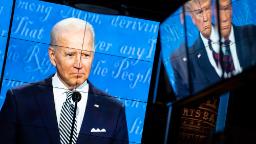
For decades, Beijing has criticized US-style democracy, holding up (very real) flaws in the American system as vindication for Chinese authoritarianism. Anyone advancing reform or liberalization in China is forced to answer for every failure in the US, and made to justify why that will be better than the Chinese system, which may not offer much in terms of representation, but at least provides stability and economic growth.
On Tuesday, Trump helped to bolster that view, and in turn, further erode global confidence in US-style democracy.
While Trump has made similar claims already in the campaign, it was still somewhat astonishing to see a sitting US President essentially rail against the electoral system itself, implying that it is broken or easily manipulated, and setting up a potential ugly fight over the eventual result.
Table Of Contents
A gift for critics of democracy
For decades, the US has actively advanced its model of democracy around the world, be it through soft-power, concerted civilian-led initiatives or raw military strength. Part of the justification for apparent US hegemony is based upon the idea of American democracy, that the US is a superpower unlike the British or Soviet empires because it is representative and its elections are free and fair.
While the record shows plenty of gaps between Washington’s supposed values and how US leadership plays out in reality, the existence of a democracy as the world’s strongest power did give some credence to the system in general, much to the chagrin of authoritarians in Beijing and elsewhere.
Trump, however, has been a gift for such critics of democracy. Not only did he take office despite losing the popular vote, due to America’s antiquated electoral system, but he has also advanced isolationalism and withdrawn the US somewhat from world affairs, all the while praising various strongman leaders around the world, including Xi and Russian President Vladimir Putin.
‘No pretense of decorum’
But beyond simply the chaos, and moderator Chris Wallace’s apparent inability to keep control, Trump’s misinformation and conspiracies about potential mail-in fraud also poked holes in the validity of the system itself.
Biden could often do little in the face of this barrage but call Trump a liar and urge people to cast their ballot.
If Americans are feeling demoralized after Tuesday night’s chaos, how easy will it be for critics of the US — in China, Russia and elsewhere — to seize on the debate to make their points, whether about problems with Washington, or the very system of democracy itself?
Reacting to the debate, Hu Xijin, editor of the nationalist state-backed tabloid Global Times, wrote that “such a chaos at the top of US politics reflects division, anxiety of US society and the accelerating loss of advantages of the US political system.”